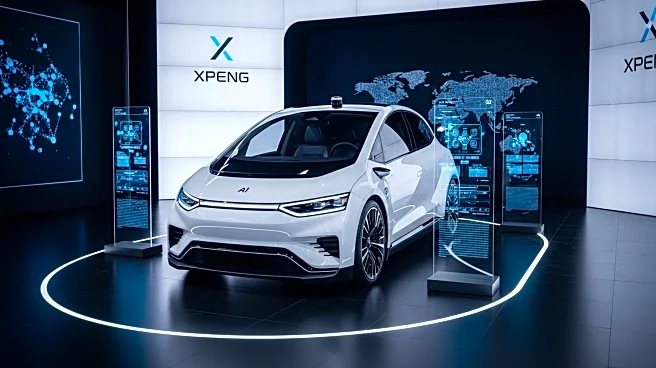What's Happening?
Xpeng, a China-based high-tech company, showcased its latest advancements in AI mobility at the IAA Mobility 2025 event. The company introduced the Next P7, a sports sedan that highlights its AI technology and intelligent driving systems. This vehicle is part of Xpeng's strategy to expand its global presence, particularly in Europe, where it plans to open its first European research center in Munich. The Next P7 features supercar-level performance and has set a new endurance record for mass-produced electric vehicles. Xpeng's AI ecosystem includes AI-powered vehicles, humanoid robots, and flying cars, reflecting its commitment to transforming mobility through technology.
Why It's Important?
Xpeng's innovations in AI mobility are significant as they represent a shift towards more intelligent and sustainable transportation solutions. The company's expansion into the European market underscores the growing influence of Chinese EV brands globally. By establishing a research center in Munich, Xpeng aims to tailor its products to European consumers, potentially increasing its market share in the region. The advancements in AI technology could lead to more efficient and autonomous driving experiences, impacting the automotive industry and consumer expectations. Xpeng's focus on AI-driven mobility solutions positions it as a key player in the future of transportation.
What's Next?
Xpeng plans to continue its global expansion, with the Munich R&D center set to open in September. The company aims to mass-produce L4 autonomous driving vehicles by 2026 and launch Robotaxi trials in China. Its NGP smart driving system is undergoing global adaptation, with top-class smart driving experiences expected by late 2026. Xpeng's flying car subsidiary, AEROHT, is preparing for the international debut of its modular flying car in Dubai, with mass production anticipated by late 2026. These developments indicate Xpeng's commitment to advancing AI mobility and expanding its product offerings.
Beyond the Headlines
Xpeng's integration of AI into mobility solutions raises ethical and legal considerations, particularly regarding autonomous driving and flying vehicles. The company's focus on AI-driven experiences may influence regulatory frameworks and consumer privacy concerns. Additionally, Xpeng's expansion into Europe highlights cultural dimensions, as it seeks to align its products with local preferences and standards. The long-term impact of AI mobility could lead to shifts in transportation infrastructure and urban planning, as cities adapt to new technologies.










